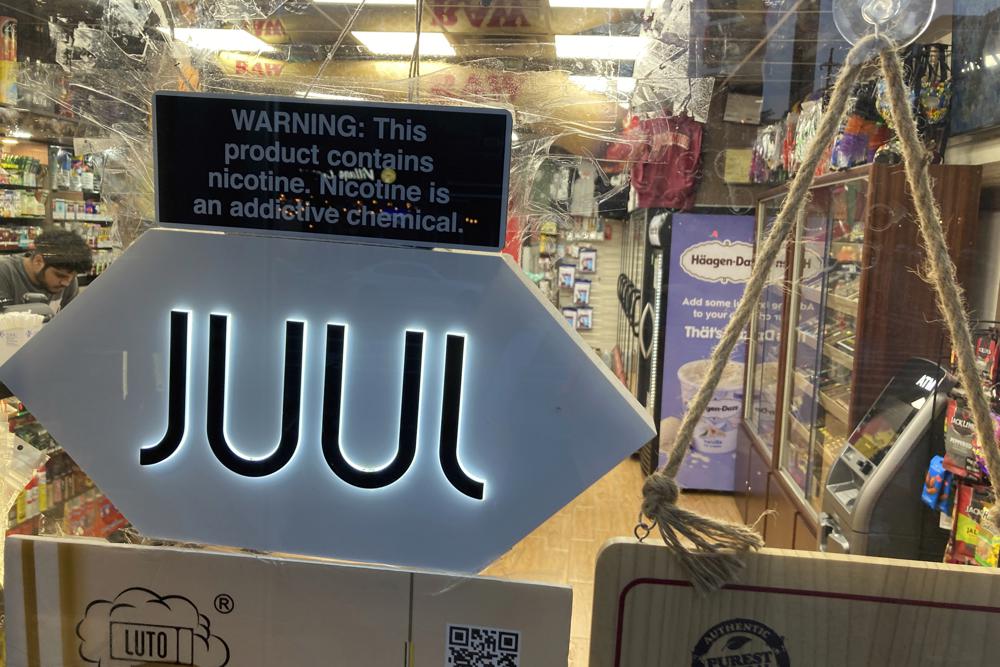Minnesota
At trial, Minnesota says e-cigarette maker Juul targets kids

MINNEAPOLIS (AP) — Minnesota Attorney General Keith Ellison personally opened his state’s case against Juul Labs on Tuesday, accusing the e-cigarette maker of using “slick products, clever ads and attractive flavors” to hook children on nicotine as the first of thousands of cases against the company reached trial.
Minnesota is seeking more than $100 million in damages, accusing Washington, D.C.-based Juul of unlawfully targeting young people to get a new generation addicted to nicotine.
“They baited, deceived, and addicted a whole new generation of kids after Minnesotans slashed youth smoking rates down to the lowest level in a generation,” Ellison said. “Now, big tobacco is back with a new name but the same game. Juul wiped out the work of our state with their slick products, clever ads, and attractive flavors.”
Juul has faced thousands of lawsuits nationwide but most have settled, including 39 with other states and U.S. territories. Not Minnesota, which won a landmark $7.1 billion settlement with the tobacco industry in 1998. Minnesota added tobacco industry giant Altria, which formerly owned a minority stake in Juul, as a co-defendant in 2020.
Altria completed its divestiture this month and says it effectively lost its $12.8 billion investment.
David Bernick, an attorney for Juul, promised jurors an “intense and interesting” trial. He said the purpose of Juul was always to convert adult smokers of combustible cigarettes to a less-dangerous product that would still provide a satisfying nicotine experience — not to lure kids. E-cigarettes aren’t safe but aren’t deadly either, he said; they’re somewhere in between. And Juul did nothing to intentionally drive youth demand, he argued, suggesting that the growth in youth vaping was more likely due to increasing adult demand resulting in ”leakage” to kids.
William Geraghty, an attorney for Altria, denied Ellison’s assertions that Altria invested heavily in Juul because it ultimately wanted to hook kids on its cigarettes, which include Marlboro. He said Altria bought its passive stake because Juul had found the key to successfully switching adult smokers of conventional cigarettes to a less harmful product, while Altria’s competing e-cigarettes had failed in the marketplace.
The lawsuit against Juul, filed in 2019, alleges consumer fraud, creating a public nuisance, unjust enrichment and conspiracy with Altria. The jury trial before Hennepin County District Judge Laurie Miller is expected to last about three weeks
Juul Labs launched in 2015 on the popularity of flavors like mango, mint, fruit medley and creme brulee. Teenagers fueled its rise, and some became hooked on Juul’s high-nicotine pods. Amid a backlash, Juul dropped all U.S. advertising and discontinued most of its flavors in 2019, losing popularity with teens. Juul’s share of the now multibillion-dollar market has fallen to about 33% from a high of 75% in 2018.
In his opening statement, Ellison argued that Juul and Altria broke the law by using deceptive actions to sell tobacco products to minors. Juul purposely made its products small and sleek to make detection by adults difficult, formulated them to deliver high doses of nicotine to addict children, added flavors that would appeal to young people and used a marketing campaign they knew would appeal to teens, Ellison said.
“Young people are innocent, and they want to explore,” Ellison said. ”“Kids are attracted to what is shiny, slick, cool — and that is exactly who Juul and Altria were targeting and preying upon.”
Bernick gave the jury an alternative explanation. Adult smokers don’t like to be seen smoking because of the social stigma, he said. So Juul designed its products to look different from conventional cigarettes and other e-cigarettes then on the market so that adults could use them discretely, he said, not so that kids could use them in school.
Bernick said Minnesota had experienced an “exponential increase’ in youth vaping even before Juul arrived on the local market in late 2017. And he asserted that the company had already ended some of its most-criticized practices, suggesting that Juul itself wasn’t to blame for the rise.
Richmond, Virginia-based Altria Group — formerly known as Phillip Morris Cos. — says it had nothing to do with the design of Juul, nor its creation of its fruit and other flavors, nor the running of the company.
In fact, Geraghty said, Juul stopped selling several of those flavors at the retail level before Altria invested in it. He denied that the marketing services that Altria provided Juul for about a year — which included the use of its shelf space at convenience stores and Juul coupons tucked into Marlboro packs — did anything to increase youth vaping in Minnesota. State health department statistics show youth vaping actually flattened out in the state between 2017 and 2020, he said.
And Geraghty said Altria never made anything off Juul sales — it would have made money only if they company’s value had increased, which it didn’t.
Juul is now appealing the Food and Drug Administration’s rejection of its application to keep selling its vaping products as a smoking alternative for adults. Juul is still being sued by New York, California, Massachusetts, New Mexico, Alaska, Illinois, West Virginia and the District of Columbia.

